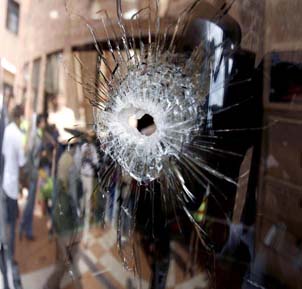Feb 13, 2026
Feb 13, 2026
 The continuous stream of terrorist attacks in Pakistan over the past many days which has resulted in the death of tens of innocents appears to have invited scant attention of the Pakistani leadership in addressing the situation with alacrity. Perfunctory announcements of condemning the attacks and shedding crocodile tears for the victims apart the power games in Islamabad and Rawalpindi continue as if these are normal times.
The continuous stream of terrorist attacks in Pakistan over the past many days which has resulted in the death of tens of innocents appears to have invited scant attention of the Pakistani leadership in addressing the situation with alacrity. Perfunctory announcements of condemning the attacks and shedding crocodile tears for the victims apart the power games in Islamabad and Rawalpindi continue as if these are normal times.
Routine reactions in the media such as a report in the News International on the blast in Peshawar on Saturday, 14 November which says, “President Zardari, PM Gillani, Foreign Minister Rehman Malik, chief ministers and governors of all the four provinces along with MQM Chief Altaf Hussein has strongly condemned the loss of innocent lives”, apart the standard explanation is that this is the reaction by the Taliban against the Army operation in South Waziristan.
Reports indicate that the Tehrik-e-Taliban Pakistan (TTP) has prepared 25 vehicles and motorcycles packed with explosives for the specific purpose of suicide bombings to challenge the Army offensive in South Waziristan. More suicide bombings would be in the offing as the government is not prepared to face the challenge despite having announced the intent to launch operations a couple of months ago. Intelligence reports have not been analyzed and necessary precautions not taken across the country to minimize the scope of strikes by the Taliban.
Another standard excuse is that terrorist attacks cannot be prevented as these are all pervasive which again does not bear scrutiny. With appropriate intelligence and preventive measures terrorist attacks are preventable provided the state shows the determination and the will to face the challenge to the society at large rather than protecting only the elites.
More over the Pakistani leadership is involved in the eternal politics of one-up-manship between the civilian and the army leadership, with Mr Zardari fighting for survival against the combined onslaught of the army, the opposition parties, some coalition partners as well as the judiciary.
Thus the political scenario is getting very unstable with the clear efforts on to replace Mr Zardari who seems to have fallen out of favor with the Army Establishment. The series of events indicate this trend starting with the Kerry Lugar Bill wherein the Army had indicated that it did not approve of the same, given that later there was no resistance in accepting it, there are indications to believe that the entire protest may have been only to place Mr Zardari on the back foot.
The NRO is the latest addition to the list of Mr Zardari’s woes; this has now been supplemented by stories of his involvement in shady submarine deals which would make the survival all the more difficult given his reputation for corruption. Some are even saying that he would have the option of either being impeached or resigning.
Mr Zardari fell out of favor with the Army as he challenged the strategic establishment in various ways starting with a call for rapprochement with India. Against this backdrop it remains to be seen how Mr Zardari maneuvers for he still seems to be having support of a major stake holder in the Pakistani political equation, America.
But this politicking is diverting attention of the Government from the challenge of terrorism facing the people of the country. With the Taliban in Pakistan responding to government operations in South Waziristan by striking almost on a daily basis in the NWFP and other areas and also having revealed the plans and preparations for such strikes, it is evident that there would be more suicide attacks expected in the forthcoming days.
These may not be restricted to the NWFP and even Punjab and the national capital Islamabad may see such strikes, though the Taliban reach in these areas is limited. Thus here it would use the affiliates such as the Lashkar and Jaish e Mohammad which are based in Punjab and which are motivated by the coalition of the US and Pakistan in the war against terror in Af-Pak as a contestation.
Given that suicide bombers are difficult to detect in normal civil areas despite the high level of vigilance and security, a strategy to target them in their hide outs would have to be evolved. Thus going to the source may be a better way of tackling the suicide terrorists in addition to the expanded securing grind in the towns and cities.
Of utmost importance however is the unity of leadership both civil and the army in such times of crisis. Yes issues as probity in public office and corruption are extremely important and have to be addressed, but when innocents are falling to suicide bombers, the focus has to be security of human lives. It is time that the Leaders devote their attention to the same on priority and enhance the security of the people rather than taking loss of lives for granted as fall out of operations in South Waziristan.
15-Nov-2009
More by : Col. Rahul K. Bhonsle